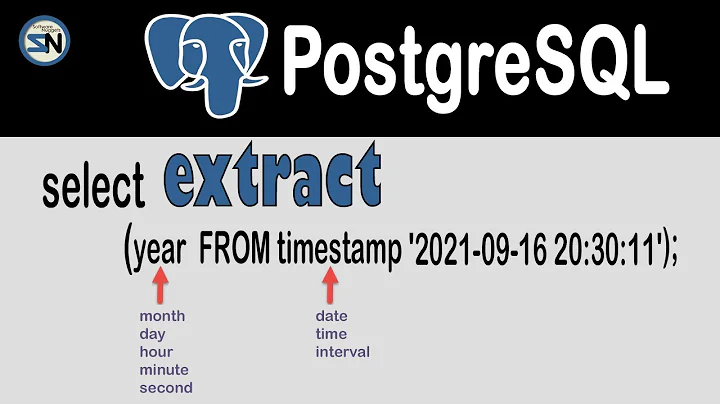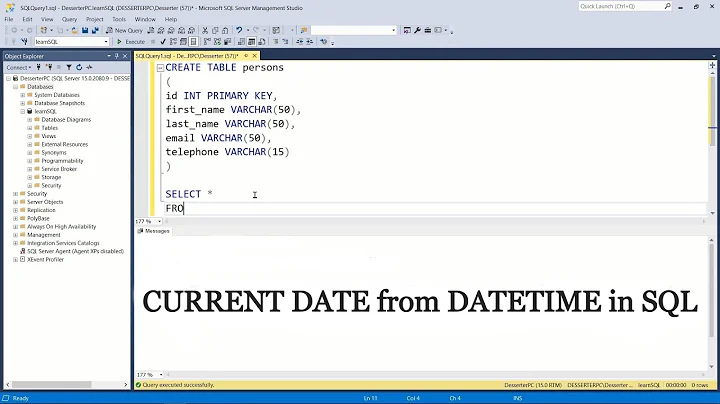Extracting hours from a DateTime (SQL Server 2005)
Solution 1
SELECT DATEPART(HOUR, GETDATE());
Solution 2
... you can use it on any granularity type i.e.:
DATEPART(YEAR, [date])
DATEPART(MONTH, [date])
DATEPART(DAY, [date])
DATEPART(HOUR, [date])
DATEPART(MINUTE, [date])
(note: I like the [ ] around the date reserved word though. Of course that's in case your column with timestamp is labeled "date")
Solution 3
Use datepart.
E.g.:
datepart(hh, date)
Solution 4
try this one too:
DATEPART(HOUR,GETDATE())
Solution 5
The DATEPART() function is used to return a single part of a date/time, such as year, month, day, hour, minute, etc.
datepart ***Abbreviation
year ***yy, yyyy
quarter ***qq, q
month ***mm, m
dayofyear ***dy, y
day ***dd, d
week ***wk, ww
weekday ***dw, w
hour ***hh
minute ***mi, n
second ***ss, s
millisecond ***ms
microsecond ***mcs
nanosecond ***ns
Example
select *
from table001
where datepart(hh,datetime) like 23
Related videos on Youtube
Lukasz Szozda
Snowflake Data Superhero - Data(Ops) Enthusiast - Modern SQL's Advocate Disclaimer: Provided code samples, demos and descriptions are for educational purposes only. They are not production code and should be treated at most as Proof of concept. They do not represent thoughts, intentions, plans or strategies of my employer.
Updated on February 20, 2022Comments
-
Lukasz Szozda about 2 years
I can extract the month and day by using
Day(Date()),Month(Date()). I can't extract hours, withHOUR(Date()). I get the following error.'HOUR' is not a recognized built-in function name.How can I extract hours?
-
 Tarzan about 3 yearsI find this useful: SELECT FORMAT(getdate(), 'hh:mm:ss', 'en-US') 'Time'
Tarzan about 3 yearsI find this useful: SELECT FORMAT(getdate(), 'hh:mm:ss', 'en-US') 'Time'
-
-
Adir D over 9 yearsPlease spell out things like
HOURinstead of using lazy shorthand that isn't always what you expect (tryy). Feel free to maintain your own code however you like, but for teaching, I am opposed to promoting lazy shorthand that leads to confusion or worse. See #6 here blogs.sqlsentry.com/aaronbertrand/… and sqlblog.com/blogs/aaron_bertrand/archive/2011/09/20/… -
 Cindy Meister about 8 yearsWhat's the point of your contribution, which repeats information provided in almost every other "answer" to this question?
Cindy Meister about 8 yearsWhat's the point of your contribution, which repeats information provided in almost every other "answer" to this question? -
Auspex over 5 years@AaronBertrand That's not "lazy shorthand", it's the documented short-form. "Lazy" is using short-forms that are shorter than the minimal documented version, which may work but may have unintended consequences.
-
Adir D over 5 years@Auspex Can’t force you to not completely miss the point or to read the reasons behind my words. Not everything that’s documented is a best practice.
-
Auspex over 5 years@AaronBertrand I got the point. But you're trying to enforce (to the extent of improperly editing multiple people's answers) your own standards. Your "best practice" is nothing of the sort.
-
Nico Haase almost 4 yearsPlease add some explanation to your answer such that others can learn from it



![30.[C#] Cách Insert dữ liệu ,Date ,DateTime ,SmallDateTime (Code Chuẩn Và Đầy Đủ)](https://i.ytimg.com/vi/WvE_b8TQObI/hq720.jpg?sqp=-oaymwEcCNAFEJQDSFXyq4qpAw4IARUAAIhCGAFwAcABBg==&rs=AOn4CLDjNyOfPTce6q0RNIx9291e2iaV4g)






